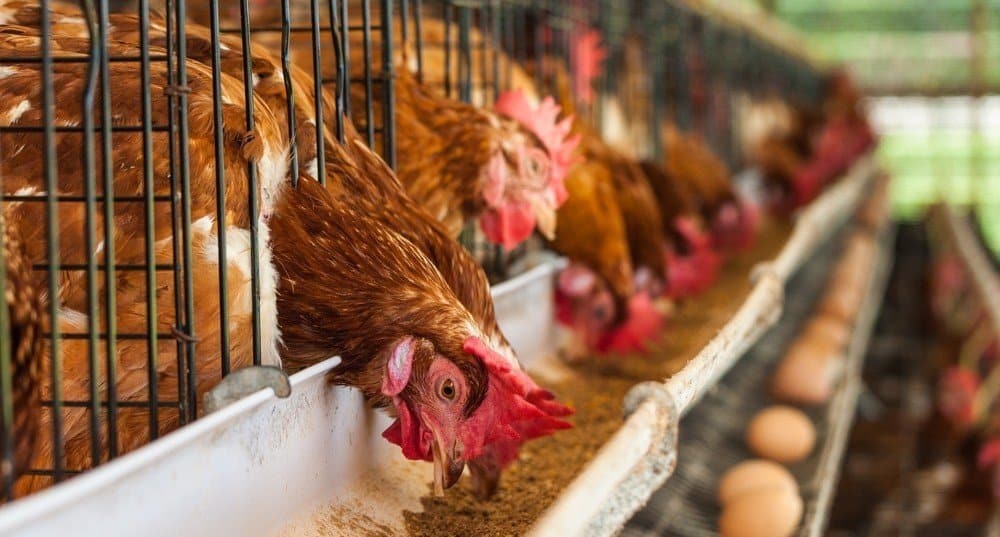
There are some compelling reasons to choose pastured free range eggs vs caged eggs, and not just for the welfare issues. The levels of nutrition in free range eggs are being shown to be significantly better as well. Here’s a breakdown of why it’s really worth rejecting caged eggs and choosing pastured free range for your family’s health.
Life As a Caged Chicken

Battery egg production is a sad indictment on human’s treatment of animals. Bred in huge production facilities, the male baby caged chickens are of no use and are disposed of like garbage. Female chicks are grown in extremely cramped and dark conditions and fed a processed diet.
Once they reach laying age, they are put into cages less than half the size of an A4 sheet of paper. The wire floor in these cages slopes down on an angle. This prevents the hens from sitting properly and their feet often become deformed as a result.
They also have the tips of their beaks cut or burnt off to try and prevent them doing any damage to the other birds caged right beside them. In fact, some of these toxic, windowless warehouses can contain as many as 100,000 caged chickens, never seeing sunlight and fed a diet of corn waste and chemicals.
Even if you don’t have a problem with animals being treated like this (and I really hope you do – lack of empathy for the suffering of animals is one of the hallmarks of a sociopath), it isn’t hard to see why eggs coming from caged chickens kept in these conditions and fed this kind of diet are far from what they should be.
The Benefits of Pastured Free Range Eggs vs Caged Eggs
The best type of eggs come from pastured free range chicken, where the birds are allowed to roam freely and eat insects and plants. The nutrients from this varied diet can then be transferred into the eggs and, as you’ll see ahead, the nutritional profile of free range eggs are significantly better in many ways.

Unfortunately, some large-scale egg farmers have exploited lax definitions of free range chicken and have been able to use this label, even when they only allow their confined chicken out occasionally to concreted areas. These are not true free range eggs.
Real farmers that produce pastured free range and organic eggs will almost always be proud of the fact and promote it on their packaging. These eggs will usually have a much deeper yellow/orange yolk, avoid the inflammatory fat profiles and salmonella issues of caged eggs and I personally think taste much better too.
The best source of pastured free range eggs are smaller farmers in your local area and they deserve your support. The EatWild website also has a good state-by-state listing of grass fed meat, dairy and egg producers from the USA.
This is a relatively inexpensive food and it’s worth a little more for all the free range egg benefits ahead.
Here’s an interesting video showing why companies are switching to cage-free eggs.
Health Benefits of Free Range Eggs
A comparison of nutritional data for caged versus free range eggs found, on average, the free range eggs had:
- Twice as much omega-3 fatty acids.
- Three times more vitamin E.
- Seven times more pro-vitamin A beta-carotene.
- A quarter less saturated fat.
- A third less cholesterol.
Other tests have demonstrated that pastured eggs have up to six times more essential vitamin D than regular supermarket eggs. They have also been shown to have significantly more B vitamins than a factory egg.
Egg yolks are also a known source of lutein and zeaxanthin, but the pale, watery yellow yolks in eggs from caged chickens, fed the waste products of the grain industry, contain very little.
Lutein and zeaxanthin are two important antioxidants for the health of your eyes. They help to protect the delicate macula region of your eye from damaging UV and high-intensity blue light.
If you’d like to protect your vision as well as improve your overall health, look for the deep yellow/orange yolks you’ll find in real free range eggs.

Conclusion
Social media gives us a unique opportunity to spread the word on these kind of issues. If enough people share articles like this and more of us choose free range eggs, industrial scale farmers will be forced to change their cruel production methods and hopefully free range eggs can go back to being the natural and healthy super food they’re designed to be.
Hi Jim, is there any studies which support your article? All I found were supporting the opposite…
Thank you
Hi Luca,
I’ve seen nothing showing caged eggs are superior nutritionally and think that would be a hard case to make given they are fed processed corn waste and a few synthetic vitamins and regularly treated with antibiotics due to their living conditions – http://abcnews.go.com/Health/truth-eggs/story?id=16871055
There is a study examining cholesterol levels of eggs and showing little difference between the two, but it’s been long established that the cholesterol in eggs does not usually affect a person’s cholesterol levels. In fact, replacing grain based foods for eggs is more likely to enhance weight loss with no noticeable effect on cholesterol – http://www.ncbi.nlm.nih.gov/pubmed/18679412
This link from the article provide a bit more information on nutritional content – http://www.motherearthnews.com/real-food/tests-reveal-healthier-eggs.aspx#axzz2egABlsN2 though each egg may well as different as the chicken that laid it.
Jim
We appreciate your article and research behind it.
We have been concerned about the caged hens issue. To think that animals suffer for years as a result of this type of treatment is not acceptable and truly sad.
Although more expensive, we will make sure to buy cage free eggs from now on.
Thanks again
Hi Alex and thanks for your positive comments.
Free range eggs aren’t that much more compared to most other healthy sources of protein and I really feel they are worth it, both humanely and nutritionally. I agree that these practices that cause such suffering to animals like this are unacceptable and reflect on us as a society.
Hopefully more people will share this information. The more people that are aware of this the more chance we have to make a difference.
Humanely perhaps, but nutritionally is complete non-sense
“I’ve seen nothing showing caged eggs are superior nutritionally”
That was not the question Luca asked. He asked if there was anything to support your claims that free range eggs are. You’ve failed to supply any proper evidence that such is the case. The article you reference cites several sources, some of which do not hold up as solid evidence (and in quite a poor manner too; such as missing issue numbers and titles of papers.)
Their own study does not show any hint of what methods they used, and incomplete data, lacking basic things such as sample size and mean deviation of nutritional values.
That is so weird. I was just discussing this issue with another ‘true believer’, and when challenged on their claim that free-range were healthier…. they did the same thing, suddenly saying theres no proof that raged eggs are healthier. Very odd behavior
I have my own free range hens, only five, but it is perfect for my family! The eggs are bright orange and taste wonderful! They are also really good pets 🙂 If feel really bad for the chickens in the factories!!! 🙁 🙁
This is what the evil sickness of capitalism does to life on our planet!
I agree entirely. Eggs from caged birds are watery and tasteless whereas those from properly free-roaming hens have dark, full-bodied yolks and much thicker shells.
So you based this article on no evidence and just made up stuff, great
Hope you aren’t surprised 🙂
So i have eaten caged and cage free eggs. I really prefer caged eggs. I seem to be able to taste the struggle of
Life in those eggs. Caged free just doesn’t really get my pumped up for a day full of wide load truckers.
its really wrong to hurt these innocent, intelligent creatures just for our consumption! Become a vegitarian!
Do you have sources? Livestrong claims free range eggs have the same nutritional value as caged eggs. I have 50 chickens and while the logic (different diets) absolutely makes sense, all the articles I can find reference studies but don’t go into further detail. If you have them, please share!
Considering how many people buy eggs, and how trustworthy the internet is, I’d say some people are being paid or rewarded to make articles that support industries that sell poultry
Although reading the sources that Jim has referenced, I’m not sure what to think lol. His sources are just bashing industrial eggs and showing little real evidence
Where’s the science? where are the studies confirming these claims? You are full of shit. 5 minutes on pubmed and I have peer reviewed sources to disprove nearly every claim made in this article.
Large chicken farms have very strict standards and policies in place to ensure that the hens bred and raised on the farms, live a happy life and are not mistreated whatsoever. Employees are watched carefully and any mistreatment of a bird, weather it is a hen or a rooster is cause for immediate dismissal. The barns are remarkably tidy and the birds are all inspected daily, food and water are always supplied and there is plenty of ventilation. If any of these things are not supplied at any time, there are alarms in place to ensure immediate action will be taken. Extreme caution is necessary when dealing with a large flock of any bird for they are very susceptible to influenza and thus strict sanitation policies are put in place. Contact with birds from the outside is very risky. If one bird is infected it can cause the entire barn of thousands to become sick and die. They do not often have the opportunity to roam free but not for reasons as to be cruel, only for the wellbeing of the birds.
Lies from start to end. , a 1994 study in Southern California of a specific salmonella type found only 1 percent prevalence in caged hens compared with 50 percent prevalence in free-range hens. European researchers have concluded the from their studies that free range chickens are more stressed and their eggs are heavily contaminated with toxic heavy metals. Beware the hidden animal rights agenda to deprive the world of the right to eat meat. USDA went to enriched caged housing to protect the public from death and disease from salmonella found in free roaming chicken eggs. The chickens cannibalize each other, and lay their eggs in feces. Due to their paper thin shells salmonella and other deadly diseases live in these eggs making people extremely ill up to and including death.
you stupid dumb ass
fuck stupid are you-yoda
this article was literally cancer haha. I bet you have never even been in a hatchery complex you fucking hillary supporter
The only truth to this article was that cage free eggs have more vitamin D, birds are fed antibiotics to prevent themselves from diseases (just like humans who get sick need antibiotics so they can get better), and the fact that we should support local farmers.
These so called disease ridden complexes have the manure pits flushed every single day. Birds have not been fed hormones since the 1950’s because little do you know it is illegal (which is the main giveaway that you obviously did not do your research before coming to shit on an industry that does it’s very best to make sure animal welfare is the top priority while still considering the fact that 1 in 6 Americans has food security issues because uneducated PETA idiots like yourself think that birds should be treated like humans. Caged eggs are so much more economical to produce and if you have a problem with that then don’t come running to people like me when you are charged 10 bucks for a dozen eggs. People who already can’t afford eggs will not be in any better of a situation, because I have to send a worker out to go pick up 1000 eggs on the ground in a field. This creates a labor cost that causes your egg prices to sky rocket. The world being fed is priority #1 to everything else. How selfish Americans like you truly are to think it is alright to put an animals welfare over a human’s who is starving because they can’t afford eggs.
And not just eggs, I mean food from animals in general. We can’t afford to take an animal’s welfare over a human’s right now. The world is starving and we have to feed it. We have to do what is best for the world not a chicken.